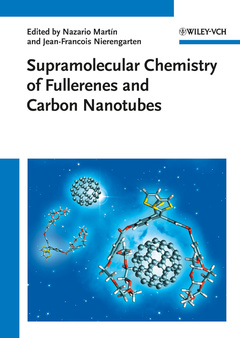Description
Supramolecular chemistry of fullerenes and carbon nanotubes
Coordinators: Martin Nazario, Nierengarten Jean-Francois
Language: English
Subject for Supramolecular chemistry of fullerenes and carbon nanotubes:
Publication date: 05-2012
326 p. · 17.6x24.9 cm · Hardback
326 p. · 17.6x24.9 cm · Hardback
Description
/li>Contents
/li>Biography
/li>
Collating our current knowledge and the latest developments for enabling breakthrough discoveries, this book focuses on the synthesis and applications of materials that are based on supramolecular assemblies of carbon nanostructures, with an emphasis on fullerenes and nanotubes. In so doing, it provides readers with an overview of the different types of supramolecular architectures, accentuating the outstanding geometrical, electronic and photophysical properties of the building blocks and the resulting structures. It makes use of basic concepts and real-life applications from simple syntheses to complex architectures, from instructive examples to working experimental procedures, and from photophysics to solar cells. A large part of each chapter is devoted to the methods and possibilities of controlling and tuning these molecular assemblies in order to obtain working devices.
Fascinating reading for materials scientists, organic chemists, molecular physicists, and those in the semiconductor industry.
Fascinating reading for materials scientists, organic chemists, molecular physicists, and those in the semiconductor industry.
Introduction: Preparation, Covalent Chemistry, Applications
Receptors for Pristine Fullerenes: Cyclodextrines, Cycloveratrilenes, Calixarenes,
Nanorings,
Concave-Convex Interactions
Supramolecular Chemistry of Porphyrins and C60
Supramolecular Chemistry of Crown Ethers and C60
H-Bonding Involving Fullerenes
Fullerene-Containing Catenanes and Rotaxanes: Molecular Motors and Machinery
Photophysics of Supramolecular Systems Involving Fullerenes and Carbon Nanotubes: Energy versus Electron Transfer
Liquid Crystals, Micelles and Gels
Self-Assembly on Surfaces: Self-Assembled Monolayers, Nanoparticles
Organizing Fullerenes on Solid Surfaces with STM
Ionic Motifs
Applications of Supramolecular Ensembles with Fullerenes and CNTs: Solar Cells, Transistors
Supramolecular Chemistry of CNTs and other Carbon Nanostructures
Supramolecular Fullerene Polymers and Dendrimers
Practical Aspects: Methods, Techniques, Practical Examples, Experimental Procedures
Receptors for Pristine Fullerenes: Cyclodextrines, Cycloveratrilenes, Calixarenes,
Nanorings,
Concave-Convex Interactions
Supramolecular Chemistry of Porphyrins and C60
Supramolecular Chemistry of Crown Ethers and C60
H-Bonding Involving Fullerenes
Fullerene-Containing Catenanes and Rotaxanes: Molecular Motors and Machinery
Photophysics of Supramolecular Systems Involving Fullerenes and Carbon Nanotubes: Energy versus Electron Transfer
Liquid Crystals, Micelles and Gels
Self-Assembly on Surfaces: Self-Assembled Monolayers, Nanoparticles
Organizing Fullerenes on Solid Surfaces with STM
Ionic Motifs
Applications of Supramolecular Ensembles with Fullerenes and CNTs: Solar Cells, Transistors
Supramolecular Chemistry of CNTs and other Carbon Nanostructures
Supramolecular Fullerene Polymers and Dendrimers
Practical Aspects: Methods, Techniques, Practical Examples, Experimental Procedures
Nazario Martín is full professor of Organic Chemistry at the University Complutense of Madrid and vice-director of the Institute for Advanced Studies in Nanoscience of Madrid (IMDEA-Nanoscience). Professor Martín's research interests span a range of targets with emphasis on the molecular and supramolecular chemistry of carbon nanostructures such as fullerenes, endofullerenes, carbon nanotubes and graphenes, ¿-conjugated systems as molecular wires and electroactive molecules, in the context of electron transfer processes, photovoltaic applications and nanoscience. He has published over 400 papers in peer reviewed journals, and he has co-edited six books related with carbon nanostructures, and eight special issues as guest editor in well-known international journals. He is a member of the editorial and international advisory board of prestigious international journals. He is a fellow of The Royal Society of Chemistry and the President of the Spanish Royal Society of Chemistry (2006-2012).
Jean-François Nierengarten is a CNRS Researcher (Directeur de Recherche) at the University of Strasbourg, France. His research interests range from covalent and non-covalent chemistry of fullerenes to dendrimers and pi-conjugated systems with unusual electronic and optical properties. Jean-François Nierengarten has received numerous awards, including the bronze medal of the CNRS, the SFC-ACROS prize from the Organic Chemistry Division of the French Chemical Society and the Grammaticakis-Neumann Prize from the French Academy of Science. He is currently the Secretary of the Fullerenes, Nanotubes and Carbon Nanostructures Division of the Electrochemical Society and a fellow of the Royal Society of Chemistry.
Jean-François Nierengarten is a CNRS Researcher (Directeur de Recherche) at the University of Strasbourg, France. His research interests range from covalent and non-covalent chemistry of fullerenes to dendrimers and pi-conjugated systems with unusual electronic and optical properties. Jean-François Nierengarten has received numerous awards, including the bronze medal of the CNRS, the SFC-ACROS prize from the Organic Chemistry Division of the French Chemical Society and the Grammaticakis-Neumann Prize from the French Academy of Science. He is currently the Secretary of the Fullerenes, Nanotubes and Carbon Nanostructures Division of the Electrochemical Society and a fellow of the Royal Society of Chemistry.
© 2024 LAVOISIER S.A.S.




